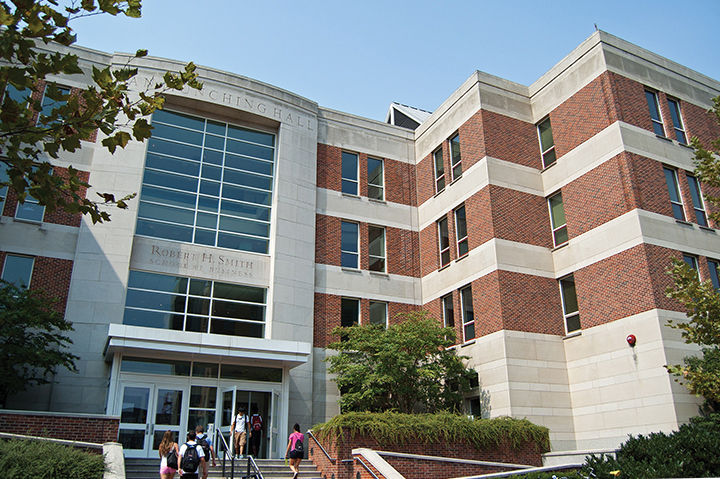
Outside of Van Munching on South Campus.
This university plans to gradually increase tuition for business, engineering and computer science majors during students’ junior and senior years starting in the fall, university President Wallace Loh said.
The University System of Maryland Board of Regents will vote on this proposal as well as a systemwide 5 percent tuition increase at its meeting tomorrow. The university also increased midyear tuition by 2 percent this past semester.
“Unlike all other funding, all of this funding goes right back to these three programs,” Loh said of the major-specific increases. “It’s not for the central administration. Students will see an immediate benefit to their education as a result.”
The proposed business, engineering and computer science tuition increases would be phased in over four years. Current juniors would see a $700 tuition increase senior year, current sophomores would see a $700 tuition increase junior year and a $1,400 increase senior year, and current freshman would see a $1,400 tuition increase junior year and a $2,800 increase senior year, according to the university proposal.
Future university students enrolled in these majors will receive $2,800 tuition increases junior and senior year after paying the university’s flat tuition rates freshman and sophomore year.
Pell Grant recipients will not be affected, as 25 percent of funds raised by the increase will be allocated toward grants for these students and other financial aid, according to the proposal.
Junior and senior business, engineering and computer science majors compose about 20 percent of the university’s undergraduate population, according to the proposal.
The university decided against increasing tuition for freshman and sophomore students enrolled in those majors because those students might switch to another major before making it to the more costly upper-level classes, said Brian Ullmann, university marketing and communications assistant vice president.
Business and engineering majors cost the university an average of 25 percent more than other majors to provide the necessary materials for instruction in junior- and senior-level courses.
Most Big Ten universities charge students enrolled in business, engineering and computer science an increased tuition rate. This university modeled its tuition increase after the median tuition increase of $5,600 in those Big Ten institutions, which is why future students will see that amount split between junior and senior year, Loh said.
Sixty-five percent of the increased funds will go toward hiring 23 new faculty members — five business, 12 engineering and six computer science — as well as improve the student-to-faculty ratio across the departments.
Ten percent of the funds gained will go toward increasing enrollment in each program, according to the proposal. This could allow the departments to add more sections for a course and therefore admit more students to the major, Ullmann said.
The deans of each of the three colleges submitted letters to the Board of Regents in support of the proposal, citing the need to reduce class sizes, update facilities and hire new faculty, staff and advisers.
The engineering college added 10 net full-time faculty positions since 2008, while its enrollment increased by 43 percent during that same time, engineering school Dean Darryll Pines wrote.
“We owe it to our undergraduate and graduate students to deliver them a first-class high-value engineering education,” Pines wrote.
The computer science department has seen a 116 percent increase in enrollment over the past five years and is currently the major with the highest enrollment at the university. However, the program has eight instructors to teach most of the introductory courses and three advisers for 1,900 students, Jayanth Banavar, computer science, mathematical and natural sciences dean wrote in a letter to the Board of Regents.
The department has not seen a net increase in tenure-track faculty over the past four years, Banavar wrote.
“We are in dire need of resources to preserve and enhance our educational programs,” Banavar wrote. “Increased investment in our programs will add value to our students’ degrees and, in turn, to the economy of the state and nation.”
Business undergraduates are willing to pay more for better quality services, business school Dean Alexander Triantis wrote, citing a survey conducted by the business school’s dean’s student advisory council.
“I really do believe that this, in the long run, will increase the value of a University of Maryland degree in these fields,” Loh said. “We need to talk about flagship excellence and affordability. What we’ve done with the proposal is strike a balance.”
For more information read the documents below:
[ READ MORE: Differential Pricing Proposal ][ READ MORE: Letters of Deans in Support of Differential Pricing in Engineering, Business, and Computer Science ]



